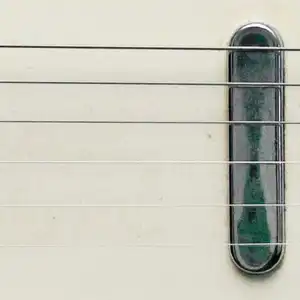Are Guitars Meant to be Played With a Certain Type of Strings?


Today, let’s tackle a common question: are some guitars truly meant for a specific gauge, alloy, or type of string? You might hear this from friends, see it on forums, or even read it in a manufacturer’s specs. Sometimes it’s presented as gospel truth—other times it’s more of a suggestion. I’ll break down the main situations where this idea pops up, and share my thoughts on whether it actually holds water.
Be sure to subscribe to our YouTube channel to keep up with more great videos like this one.
1. "But Jazzmasters Were Designed for Flatwounds…"
One of the most common claims is that certain guitars were designed with a specific set of strings in mind—and that they won’t really work with anything else. Jazzmasters and Jaguars are the most cited examples, with some players insisting they were meant for flatwound strings.
Now, I’ll admit—flatwounds can sound great on a Jazzmaster or Jaguar. But saying they were only made for them? That’s a stretch. Yes, Jazzmasters were originally marketed to jazz players, so the designers probably expected many to use flatwounds. But back in that era, players used both roundwound and flatwound strings, often in much heavier gauges than we’re used to today—think .014 to .060. In that sense, all guitars from that time were built with heavy strings in mind.
That’s why I think it’s cherry-picking to say a given model was built for a very specific string type or gauge. Most guitars handle a range of sets just fine, whether that’s 9s, 10s, 11s, or beyond.
That said, I do have my own preferences. On a Jazzmaster, I love 11s—they feel balanced and lively. 9s feel a bit odd to me, 10s are okay, and 12s start to feel too stiff. But that’s a matter of taste, not a hard rule. The same goes for other guitars: you might want to lean into the boominess of a Les Paul with heavy strings, or tame it with a lighter gauge or different alloy.
2. "But the Manufacturer Recommends .012s…"
Another common source of this belief comes directly from manufacturers. They’ll say a guitar was set up for a certain gauge—often implying that’s the right choice.
For electric players, this rarely becomes dogma. Most electrics ship with 9s, and many players immediately swap to 10s or 11s without a second thought. We’re used to tweaking intonation or making minor adjustments.
Acoustic players, however, tend to take these recommendations more literally. I’ve heard plenty of folks say things like, “Taylor says to use this gauge, so that’s all I can use.” But in reality, most acoustics can handle a wide range—anything from 10s to 13s, and sometimes even heavier.
The main differences when changing gauges are setup-related. On electrics, intonation is the first thing to check, especially with big changes (like 9s to 11s). On tremolo-equipped guitars, you may also need to adjust spring tension. And for both electrics and acoustics, the nut is key—many new guitars have slots cut too narrowly for anything bigger than their stock strings. Widening them slightly is an easy, permanent fix that still works fine if you later switch back to lighter strings.
So, while factory recommendations are worth noting, they’re not limitations. They’re just the starting point from the setup bench.
3. "But That’s What I Like…"
The final case is one I actually agree with—choosing strings because you’ve tested and found what works for you on that guitar.
Tommy Emmanuel has talked about this—how he’ll try various sets until one feels and sounds right, and then even revisit the choice as the guitar or his needs evolve. I’m the same way, especially with acoustics. I’ll try different gauges, alloys, wound thirds, heavier bottoms—whatever it takes to find the set that makes a particular guitar sing.
This is especially true when you own multiple acoustics. The strings that make your rosewood 000 sparkle might leave a mahogany dreadnought sounding dull. Different woods, body shapes, and builds resonate differently and call for different string characteristics.
The important distinction is that your perfect set might not be someone else’s. The right strings are the ones that inspire you, make your playing more enjoyable, and keep you picking up the guitar.
Final Thoughts
In most cases, guitars aren’t “meant” for just one gauge or type of string. Historical design intentions, factory setups, and personal taste all play a role—but none of them should lock you into a single choice.
Experiment. See what works best for your guitar, your hands, and your ears. And if you have a guitar that truly feels perfect with one particular set, that’s great—just remember, that’s your perfect match, not a universal truth.
Do you have a go-to set for a specific guitar? Or have you been told your guitar “needs” a certain gauge? Share your experiences in the comments—I’d love to hear them.
Other Posts you may like

Guitar Strings Order: How the Guitar is Tuned and Why

Two Handed Tapping: Our Top 8 Tappers of All Time

Which Guitar Strings Wear Your Fret Wire Down More?

What is Nashville Tuning? Its History, Best Guitar Strings & Uses

Guitar Scale Length Explained: String Tension & Playability

What Guitar Strings I Used To Play...
0 Responses
Leave a Reply
Your email address will not be published. Required fields are marked *

